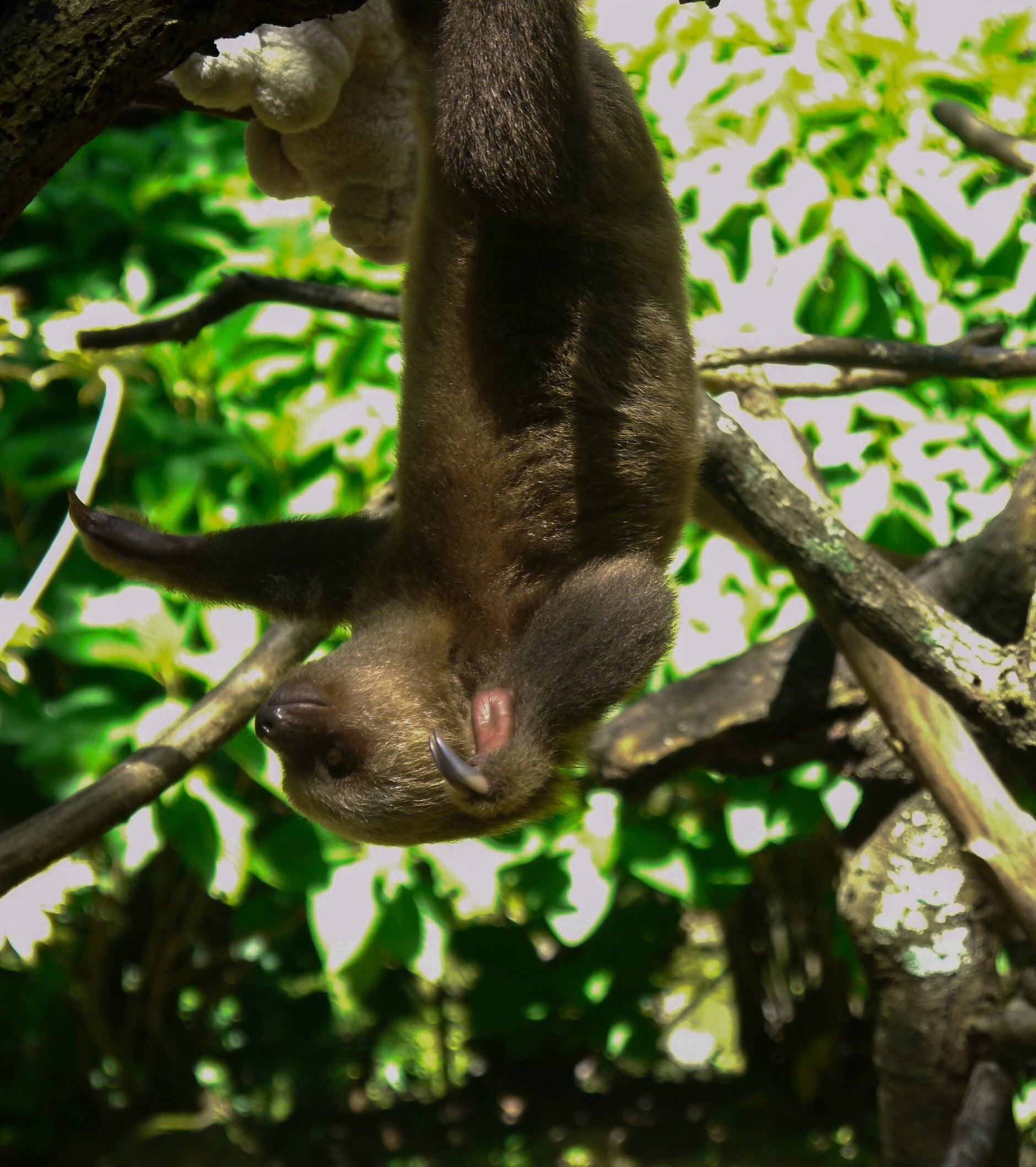Lucy and Maui are two calm and gentle two-toed sloths who now enjoy a peaceful life together. Both had accidents involving electrical wires, which led to serious injuries and the loss of some limbs. Although they can’t return to the wild, they’re safe and well cared for. These days, they spend their time relaxing in the trees, napping, and slowly exploring their new home.


Cristiano was taken from the wild when he was just a baby and kept as a pet. Unfortunately, he was given the wrong kind of food, which caused bone problems over time. Now, with a plate in his hip and jaw, and regular checkups for his kidneys, Cristiano is getting the medical care he needs. He may not be able to live in the wild again, but he's gaining strength and living a calm, protected life.
Ronaldinho is a margay — a small, spotted wild cat — who was rescued from illegal trafficking. Although one of his kidneys doesn’t work, he’s doing well with regular checkups. He now spends his days in a safe space, where he can rest, climb, and enjoy the quiet life he deserves.


Lily is a coyote with a strong spirit. After being taken from the wild and kept as a pet, she came to the rescue center for care. She now has a few health conditions, including tumors, but thanks to regular treatment, she’s comfortable and well looked after. She’s found a peaceful place to enjoy life, surrounded by people who care for her deeply.
Margaret is another coyote who came from Limón, where she had been kept in a dark room for much of her life. She’s now healthy and safe, though she’s too used to being around people to return to the wild. Margaret enjoys exploring her space, watching everything closely with bright, curious eyes.


Jack and Rose are white-faced capuchin monkeys with big personalities and unique stories. Jack had a tough beginning — he was kept as a pet, mistreated, and fed so poorly that he lost all his fur. He was afraid of humans at first, but since arriving at the rescue center, he’s slowly learning to feel safe again. Rose, on the other hand, grew up around people and became a little too comfortable with them. She was often seen wandering into houses in a national park, looking for food and attention. Because of this, she couldn’t stay in the wild. Now, both Jack and Rose live at the rescue center where they can play, explore, and enjoy life in a place that truly understands their needs.
Candy is an older capuchin monkey who has been through a lot, but her gentle, calm nature stands out. After being rescued from poor conditions, she lost a finger due to an old injury, but she doesn’t let that stop her. Candy now lives a quiet and comfortable life, surrounded by people who make sure she gets the care she needs.


Caillou came from a shut-down sanctuary, where he hadn’t been getting the right care or food. He was underweight and had some leg problems. But with a proper diet, lots of love, and medical attention, he’s doing much better now. Caillou is active and playful, and his health continues to improve every day.
Mandarino is a kinkajou with a mind of his own. After being released into the wild three different times, he always found his way back to the rescue center. Eventually, he was moved to a new center where he could stay for good. Mandarino clearly knows what he likes — and now he has a safe home, plenty of food, and people looking out for him.

Releasing wild animals back into their natural habitats is not just a goal—it’s the heart of what we do. At our wildlife rescue center in Costa Rica, every step of the process is guided by ethics, science, and compassion, in collaboration with the Ministry of Environment and Energy (MINAE).





If you find a wild animal in distress, call us at +506 6048 1115 or contact MINAE immediately.
Rewilding is never rushed, especially for hand-raised infants like sloths or monkeys:
• Lack of Survival Training: Orphans don’t learn from parents, so we must simulate as much as possible.
• Genetic Considerations: Releasing animals without understanding population genetics can cause long-term harm.
• Monitoring Limits: Dense forest and limited resources can make follow-up tracking extremely challenging.
That’s why, in rare cases, we choose permanent sanctuary care when release is not ethically or biologically appropriate.
Book your volunteering adventure today and embark on a journey that promises meaningful impact, personal growth, and unforgettable memories at our rescue center."
Volunteer


